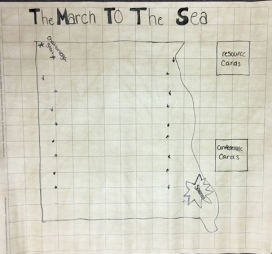I’m not sure how this happened, but in the past year, or so, I’ve spoken to two local historical societies, a senior center gathering, at one of our regular campus series, and given a talk at another local college. The topics have included, “What the Heck Does an Archivist Do, Anyway?”, our Digital History and Archives class foray into GIS and Google Maps, a local philanthropist, and our collection of the 154th New York Volunteer Infantry regiment’s papers. Other than presentations I’ve done for our local archivists, that list may exceed my total public speaking for the previous decade.
Perhaps this means that I’ve actually learned how to do my job enough that people are interested to hear what I have to say about it. More likely, there are a lot of local event planners desperate for content. The perhaps not so surprising aspect of it all is how my anxiety seems to dissipate once I get near a microphone or podium. I suspect that has something to do with teaching freshman classes in Library Research Methods for 10 years and calling bingo at a local fire hall for the subsequent 18 years. Tough audiences in both cases!

It helps that I actually feel conversant with the topics. When my notes blew away as I approached the venue for my last presentation, I felt that I could “wing it” without them, though I was pleased that the wind died down enough to get them back in hand. As I look at those notes now, I can see that my talk only very loosely followed the plan. Kind of typical practice, even when I have a much more complete script.
There is a payback for these forays out into the public sphere. As a result, we’ve added content to our archival collections as people become aware of what we do and the importance to the institutional memory of their donations. We’ve also added to our special collections for the same reasons and I’m anticipating further support for our Civil War collections as a result of my most recent talk.
Public speaking will never be one of my favorite parts of the job, but it is becoming a bigger part of it and a rewarding one, too.


